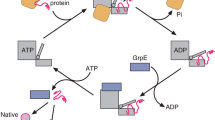Abstract
Protein overproduction in microbes frequently results in protein misfolding and aggregation though the molecular basis for this process is unclear. The HSP70 chaperonin, DnaK, was identified as an important factor controlling heterologous protein aggregation in Escherichia coli. Co-overproduction of DnaK significantly reduced human growth hormone (HGH) protein inclusion body formation and the extent of HGH aggregation.
This is a preview of subscription content, access via your institution
Access options
Subscribe to this journal
Receive 12 print issues and online access
$209.00 per year
only $17.42 per issue
Buy this article
- Purchase on Springer Link
- Instant access to full article PDF
Prices may be subject to local taxes which are calculated during checkout
Similar content being viewed by others
References
Marston, F.A.O. 1986. The purification of eukaryotic polypeptides synthesized in Escherichia coli. Biochem. J. 240: 1–12.
Schein, C.H. 1989. Production of soluble recombinant proteins in bacteria. Bio/Technology 7: 1141–1149.
Marston, F.A.O., Angal, S., Lowe, P.A., Chan, M. and Hill, C.R. 1988. Scale-up of the recovery and reactivation of recombinant proteins. Bioch. Soc. Trans. 16: 112–115.
Konrad, M. 1989. Immunogenicity of proteins administered to humans for therapeutic purposes. TIBTECH 7: 175–179.
Williams, D.C., Van Frank, R.M., Muth, W.L., Burnett, J. 1982 Cytoplasmic inclusion bodies in Escherichia coli producing biosynthetic human insulin proteins. Science 215: 687–689.
Leemans, R., Remaut, E., Fiers, W. 1987. A Broad-host-range expression vector based on the pL promoter of coliphage lambda: regulated synthesis of human interleukin 2 in Erwinia and Serratia species. J. Bacteriol. 169: 1899–1904.
Ruppen, M., Band, L., Hammer, D.J. 1986. Efficient expression of human growth hormone in Bacillus subtilis, p. 423–432. In: Bacillus Molecular Genetics and Biotechnology Applications. A. T. Ganesan, and J. A. Hoch, (Eds.). Academic Press, NY.
Hayakawa, T., Toibana, A., Marumoto, R., Nakahama, K., Kikuchi, M., Fujimoto, K. and Ikehara, M. 1987. Expression of human lysozome in an insoluble form in yeast. Gene 56: 53–60.
Sedivy, J.M. 1988. New genetic methods for mammalian cells. Bio/ Technology 6: 1192–1202.
Gribskov, M. and Burgess, R.R. 1983. Overexpression and purification of the sigma subunit of Escherichia coli RNA polymerase. Gene 26: 109–118.
Kopetzki, E., Schumacher, G., Buckel, P. 1989. Control of formation of active soluble or inactive insoluble baker's yeast alpha-glucosidase PI in Escherichia coli by induction and growth conditions. Mol. Gen. Genet. 216: 149–155.
Wilkinson, D.L. and Harrison, R.G. 1991. Predicting the solubility of recombinant proteins in Escherichia coli. Bio/Technology 9: 443–448.
Pelham, H.R.B. 1986. Speculations on the functions of the major heat shock and glucose regulated proteins. Cell 46: 959–961.
Rothman, J.E. 1989. Poiypeptide chain binding proteins: catalysts of protein folding and related processes in cells. Cell 59: 591–601.
Gross, C.A., Straus, D.B., Erickson, J.W., Takahashi, Y. 1990. The function and regulation of heat shock proteins in Escherichia coli, p. 167–189. In: Stress Proteins in Biology and Medicine. Eds: Cold Spring Harbor Laboratory Press, Cold Spring Harbor, NY.
Georgopoulos, C., Ang, D., Liberek, K. and Zylicz, M. 1990. Properties of the Escherichia coli heat shock proteins and their role in bacteriophage lambda growth, p. 192–222. In: Stress Proteins in Biology and Medicine. Eds: Cold Spring Harbor Laboratory Press, Cold Spring Harbor, NY.
Matin, A., Auger, E.A., Blum, P.H. and Schultz, J.E. 1989. Genetic basis of starvation survival in nondifferentiating bacteria. Ann. Rev. Microbiol. 43: 293–316.
Skowyra, D., Georgopoulos, C. and Zylicz, M. 1990. The E. coli dnaK gene product, the hsp70 homolog, can reactivate heat-inactivated RNA polymerase in an ATP hydrolysis-dependent manner. Cell 62: 939–944.
Gaitanaris, G.A., Papavassiliou, A.G., Rubock, A.G., Silverstein, S.J. and Gottesman, M.E. 1990. Renaturation of denatured lambda repressor requires heat shock proteins. Cell 61: 1013–1020.
De Boer, H.A., Comstock, L.J. and Vasser, M. 1983. The tac promoter: a functional hybrid derived from the trp and lac promoters. Proc. Natl. Acad. Sci. USA 80: 21–25.
Miller, J.H., Lebkowski, J.S., Greisen, K.S. and Calos, M.P. 1984. Specificity of mutations induced in transfected DNA by mammalian cells. EMBO J.. 3: 3117–3121.
Deshaies, R.J., Koch, B.D., Werner-Washburne, M. and Craig, E.A. 1988. 70kD stress protein homologues facilitate translocation of secretory and mitochondrial precursor polypeptides. Nature 332: 800–805.
Schein, C.H. and Noteborn, M.H.M. 1988. Formation of soluble recombinant proteins in Escherichia coli is favored by lower growth temperature. Bio/Technology 6: 291–294.
Groat, R.G., Schultz, J.E., Zychlinsky, E., Bockman, A. and Matin, A. 1986. Starvation proteins in Escherichia coli: kinetics of synthesis and role in starvation survival. J. Bacteriol. 168: 486–493.
Jenkins, D.E., Schultz, J.E. and Matin, A. 1988. Starvation-induced cross protection against heat or H202 challenge in Escherichia coli. J. Bacteriol. 170: 3910–3914.
Spence, J., Cegielska, A. and Georgopoulos, C. 1990. Role of Escherichia coli heat shock proteins DnaK and HtpG (C62.5) in response to nutritional deprivation. J. Bacteriol. 172: 7157–7166.
Bardwell, J.C. and Craig, E.A. 1984. Major heat shock gene of Drosophila and the Escherichia coli heat-inducible dnaK gene are homologous. Proc. Natl. Acad. Sci. USA. 81: 848–852.
Goeddel, D.V., Heyneker, H.L., Hozumi, T., Arentzen, R., Itakura, K., Yansura, D.G., Ross, M.J., Miozzari, G., Crea, R. and Seeburg, P.H. 1979. Direct expression in Escherichia coli of a DNA sequence coding for human growth hormone. Nature 281: 544–548.
Miller, J. 1984. Experiments in Molecular Genetics, Cold Spring Harbor Laboratory Press, Cold Spring Harbor, NY.
Golubinoff, P., Gatenby, A.A. and Lorimer, G.H. 1989. GroE heat-shock proteins promote assembly of foreign prokaryotic ribulose biphosphate carboxylase oligomers in Escherichia coli. Nature 337: 44–47
Author information
Authors and Affiliations
Rights and permissions
About this article
Cite this article
Blum, P., Velligan, M., Lin, N. et al. DnaK-Mediated Alterations in Human Growth Hormone Protein Inclusion Bodies. Nat Biotechnol 10, 301–304 (1992). https://doi.org/10.1038/nbt0392-301
Received:
Accepted:
Issue Date:
DOI: https://doi.org/10.1038/nbt0392-301



